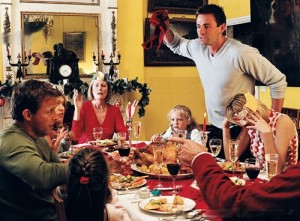 Holiday advertisers would have us think of this time of year as a happy, care-free time to live extravagantly, to buy things and to eat well. This is supposed to be a time to kiss the blues goodbye, to celebrate family, to be filled with good cheer, to let go of the past and to look to the future with joy, hope and a sense of glorious anticipation.
Holiday advertisers would have us think of this time of year as a happy, care-free time to live extravagantly, to buy things and to eat well. This is supposed to be a time to kiss the blues goodbye, to celebrate family, to be filled with good cheer, to let go of the past and to look to the future with joy, hope and a sense of glorious anticipation.
For most, this is a time of celebration and good cheer. For others, however, this time of year can be filled with heavy challenges that contribute to the holiday blues. What’s more, having a tough time when everyone is expected to be happy can increase the sense of isolation and intensify the depression. Here are some examples.
Death and Dying – Hospitals and funeral homes don’t close over the holidays because people still have accidents, get sick and pass away. It is not necessary to detail all of the things that can go wrong; we all know too well that struggling through the first Thanksgiving or Christmas without a loved one can turn a festive occasion into a time of mourning.
Unproductive Conflict – Sometimes conflict is a good thing when people obey some basic rules and focus on learning to appreciate differences of perception and opinion. At other times conflict can be painful and very difficult. Old family issues, deep personal wounds and other skeletons in the closet can surface when families come together. If those matters are not addressed in an open, healthy dialogue, they can often deteriorate into painfully predictable patterns of conflict that dishearten those who ‘just wanted everyone to be happy.’
High Expectations – During the holidays it is easy to get hopes up that this year it will be different than it has been in years past. When anticipations for joyous homecomings border on wishful thinking, the let down can be particularly discouraging when reality shatters hopes for change. We all have a sense for how things ‘ought’ to be….
Divorce and Step-Family Tensions – So many issues can arise when families have to cope with child visitation agreements and step-family dynamics. Broken agreements, unilateral pronouncements and favoritism–whether perceived or real–can introduce real pain in situations where anger, resentment and bitterness already hang over a home like a dark thundercloud. Forced smiles mask the deep hurts that lie beneath the surface where kids fall victim to a couple’s ongoing retaliation against their former spouses.
These and other matters can uniquely arise with interpersonal relationships as best intentions are misinterpreted and reality shatters hopeful anticipations. The holidays can, indeed, be discouraging; even heart-breaking. Even when everyone is relatively happy, one family member who struggles with depression–whatever its root cause–can cast a pall that brings everyone else down. This, in turn, can add to the sense of isolation, guilt and even shame that already burdens someone who ‘just can’t get over it.’
Marriage and Family Therapists are specially trained to help couples and families discover ways to cope within the context of interpersonal realities and individual differences. Many times a simple listening ear of someone who stands outside of the family dynamics can clarify issues, foster an inner resolve and fortify coping skills that, many times, clients already possess but may have forgotten or got lost in the fragmentation that is happening around them. So many families become locked into dysfunctional patterns that sometimes need ‘simple’ interventions to get back to the normal patterns that are familiar, helpful and hopeful.
